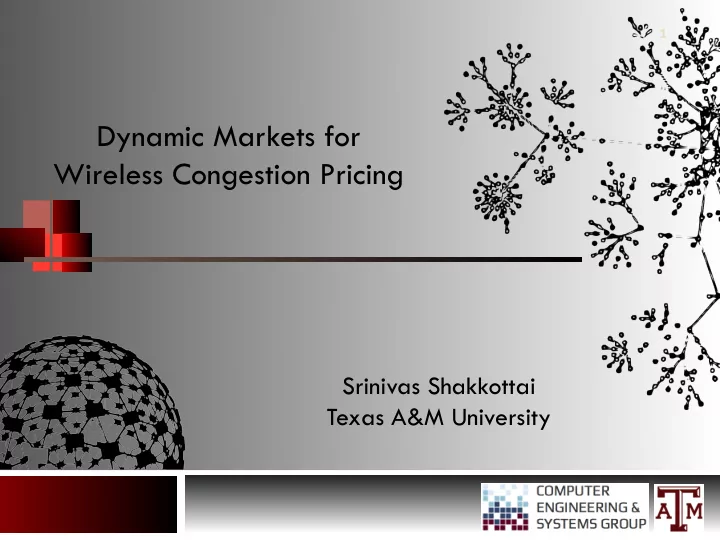

1 Dynamic Markets for Wireless Congestion Pricing Srinivas Shakkottai Texas A&M University
Societal Networks 2 ¨ Congestion Pricing � Road Networks � Public Transportation � Smart Grid � Cellular Data?
Societal Networks 3 ¨ Congestion Pricing Large number of agents � Road Networks � Public Transportation Infrequent Mean � Smart Grid interaction Field between � Cellular Data? Game subsets Repeated decisions: when how much?
Related Work 4 ¨ Time Dependent Pricing System: � S. Ha, S. Sen, C. Joe-Wong, Y. Im, and M. Chiang, "TUBE: Time Dependent Pricing for Mobile Data", ACM SIGCOMM 2012. ¨ Theory of Mean Field Games: � K. Iyer, R. Johari and M. Sundararajan: “Mean field equilibria of dynamic auctions with learning”, ACM Conference on Electronic Commerce 2011.
Mean Field Equilibrium 5 ¨ Steady state action distribution of single agent = Empirical distribution of infinite agents over one step. State Π x 1 Assumed V ∗ ρ , θ ∗ ρ ρ x 2 mixed ρ strategy. Value and x 3 Action functions
Motivation 6 ¨ A now-standard approach to scheduling in queueing systems is the Max-weight idea (Tassiulas & Ephremides ‘92). ¨ In our context, (weighted) Longest Queue First would yield short queue lengths. ¨ How do you get queue length and cost functions? ¨ Will users reveal their true values? Conduct an auction?
System Model 7 ¨ Users of cellular data networks use apps that have differing service requirements: delay sensitivities à holding cost for queue. ¨ Users terminate apps and start new ones periodically à geometric lifetime and regeneration. ¨ The base station must schedule uplink/downlink in a “fair” manner à auction with M agents. ¨ Users move around between different cells à independence among queues.
Theoretical Results 8 ¨ MFE exists. ¨ Bid is strictly monotone increasing if holding cost is strictly convex. ¨ Essentially gives rise to max-weight (longest queue first regime). ¨ Max-weight is not just throughput optimal, it is also incentive compatible! ¨ Extendable to multiple classes of cost functions. ¨ M. Manjrekar, V. Ramaswamy and S. Shakkottai, “A Mean Field Game Approach to Scheduling in Cellular Systems” in IEEE INFOCOM ’14
Implementation? 9 ¨ Use a token-based scheme to conduct auctions à 3 Giga-tokens instead of 3 GB limits? ¨ Bid-distribution updated periodically à Low demand à Low bid. ¨ LTE frame uplink control requires stations to indicate if they wish to transmit. ¨ Supports declaration of buffer size as well. ¨ Smart phone laboratory, partially supported by Google Inc. ¨ Open WRT based scheduling in 802.11 APs.
Recommend
More recommend